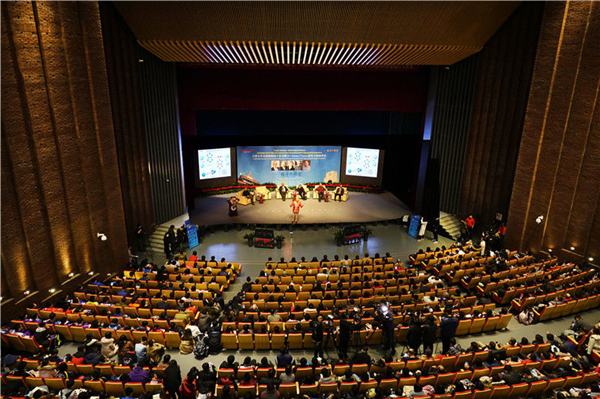 |
|
Five prestigious Nobel Laureates share their academic achievements at the Peiyang Nobel Symposium on Feb 23. [Photo provided to chinadaily.com] |
An unprecedented scientific feast was celebrated on Feb 23rd at Tianjin University, as five prestigious Nobel Laureates shared their academic achievements at the Peiyang Nobel Symposium. The event also marked three of the Laureates joining the other two as Professors at the university.
Organized by Tianjin University in strategic partnership with Nature and Science, and sponsored by world renowned magazines and institutes including Cell, JACS, CHEM, Elsevier, Thermofisher, Agilent, Pharmacodia, RSC and ACS, the conferring ceremony and symposium, themed “A Dialogue with Nobel Laureates, Inspired by Their Research Careers”, provided an extraordinary opportunity to be enlightened by the Laureates’ latest research and their pioneering sense in the world of science. Over 2,000 attendees convened at Tianjin University, including an array of academics, specialists and outstanding students from related fields.
Jay Steven Siegel, Dean of the School of Pharmaceutical Science and Technology (SPST) at Tianjin University, hosted the ceremony. He introduced Ada E. Yonath, Bruce A. Beutler and Robert H. Grubbs, who were conferred honorary professorships at Tianjin University. J. Fraser Stoddart, a short-term National 1000 Talent scholar and professor of SPST was also welcomed, alongside K. Barry Sharpless, who is currently an honorary professor of the university. Following the ceremony, the five Nobel Laureates opened up the symposium, sincerely sharing their experiences of and viewpoints on scientific research.
J. Fraser Stoddart, an American chemist and National 1000-Talent Expert, received the 2016 Nobel Prize in Chemistry for the design and synthesis of molecular machines. As the first speaker, he introduced his research achievements in the supramolecular field.
With hydrocarbon, alkane, molecular shuttles, Olympiadane and other non-covalent bonds, he built a series of molecular models. In addition, he outlined the synthesis of molecular machines and how to complete energy transfer when controlling the movement of molecules by reduction, oxidation, heating and other steps. He said that these molecular machines boast great potential in the application of energy storage and information transfer. Chinese students, as he emphasized, contributed greatly to these research projects. He concluded by attaching great significance to the achievement of Chinese specialists in the field of molecular devices.